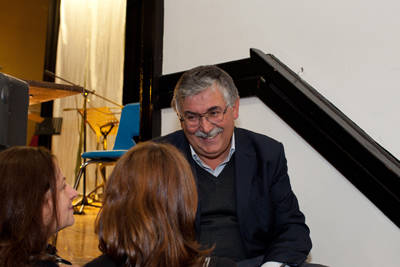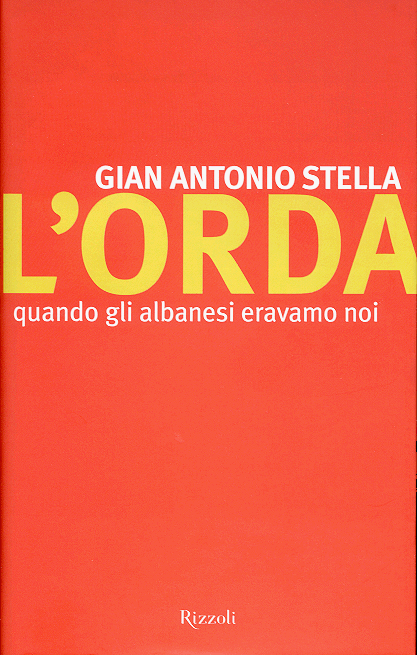Gian Antonio Stella: Madly in Love with Italy and Italy Screws Me Over
ITALIAN VERSION
I speak for few minutes with the explosive Gian Antonio Stella, well-known writer and journalist for Corriere della Sera. He is in the United States to present his latest book and show dedicated to emigration. It is a true tour de force that travels from one theater to another, from one university to another.
The conversation took place shortly after the performance at the Scuola d’Italia Guglielmo Marconi. I wait and then accompany him to the station; he is headed to Philadelphia for another event. I’m still haunted, so to speak, by the magic of The Horde (L’Orda): Stories, Songs, and Images of Italian Immigrants presented by La Compagnia della Acque and directed by Gualtiero Bertelli.
In front of an audience of very young students, we saw images, words, and songs of emigrants unfold, people and events that have marked the history of Italy and America. It includes faces of both known and unknown people. A rich story that sums up the commitment, work, and successes but also the profound failures, discrimination, and renunciation of Italian immigration to the United States, as well as forced integration, lynchings, unworthy representations of the media, and racism.
And within Stella’s story, perfectly integrated into the multimedia presentation with fascinating photographs and songs, there is a common thread that is evident from the start.
Those words, those faces of people leaving on ships and arriving, between hope and despair, between dreams and delusions, are the same people who are now landing on the shores of the Mediterranean.
The various presentations of the show, in both New York and New Jersey, were conceived and realized thanks to Prof. Teresa Fiore, Theresa and Lawrence Inserra chair of Italian and Italian American Studies.
Fiore told us that with perseverance she overcame several difficulties, including the translation necessary to make the show comprehensible to Americans and the younger generations of Italian-Americans who do not speak the language. She was then able to involve institutions, universities, and schools.
The show we just saw was realized in a school gym through the efforts of another teacher, Headmistress Anna Fiore who told us how they worked as a group to make the show possible – not only the teaching staff but also students, parents, and relatives.
The Consulate General in New York was also dedicated to providing educational direction to this great collaborative effort.
At the Scuola d’Italia we saw Stella perform in almost fatherly tones, attentive and conscious of being in front of an audience of young people. In addition to students from the Marconi School there were also students from other American schools where the Italian language is studied with the coordination of the IACE.
You presented a show in New York with a similar theme a few years ago entitled, Odysseus: Italians on the Road to Dream and Pain. What has changed since then?
The economic crisis has worsened the situation. As long as you are in a state of wealth and well-being the arrival of immigrants is tolerated. Even by the most xenophobic. Because it some ways they are useful. There was an ambiguity in those who support and vote for the Northern League. Especially entrepreneurs. Why to stop immigration? They need labor and all the studies say that immigration is absolutely necessary in Italy.
Now with the crisis, immigrants are only seen as the ones who have caused the damage. They take away jobs, they take away the housing. They have too many children and the right to decent housing has been taken away from the Italian people.
This is a difficult problem and the political left, in my opinion, was never confrontational. The opposition should have been much more active. History tells us that countries that do not welcome immigrants are those that are worse off economically.
France and Germany are taking in the most immigrants today. Germany is fine. The countries that have been more closed are worse off. Among the richest, Japan is the most closed off of all. They do not want immigrants. Last month, a Japanese minister had to resign because he had received legitimate, clean, open, visible, and transparent funds from an organization of Korean immigrants. This is the way Japan is.
And, so to speak, Gian Antonio Stella blames it all on the economy...
I’ll give you an example; I remember the data because I’ve written it so many times. Today, in Italy there are about 1.3 million dependent people. The old, the elderly. So we have about 1.3 million caretakers. If one day, they all went away we would have 1.3 million beds in shelters and old age homes.
One bed translates into land acquisition, design, construction, furniture, nursing services…one bed costs 150 thousand euros. Then you have to hire about 710, 000 people, approximately. Then something like this comes to cost a disproportionate amount. Italy absolutely can no longer afford it. If tomorrow morning all of the caretakers went away, so to speak, Italy would have to invest 150 million euros in five years, which is unthinkable.
The Horde: When We Were the Albanians from 2003 was a very important book for Italian publishing. It’s still unique to its genre. To understand it in depth, one must consider all of Stella’s other work, his continuous investigation of many other issues that vex our country.
We mention a few of his books; the titles speak for themselves: The Waste. Italy: How to Throw Away Two Billion, 1998, Tribù; Group Photo with Knight, 2001; Adrift: Why Italy is in Danger of Sinking (with Sergio Rizzo), 2008; Blacks, Gays, Jews, and Company: The Eternal War Against the Other, 2009; and the last which was recently presented at the Italian Cultural Institute, Vandals: The Assault on the Beauty of Italy (with Sergio Rizzo), 2011.
We ask him to explain the common thread that joins together various subjects that at times seem very different.
I am madly in love with Italy and Italy screws me over. Every day. They ask me, “Why do you write books that speak negatively about Italy?” I don’t speak negatively about Italy. I get angry with Italy because I love her. If you have a woman who doesn’t interest you, you don’t care if she cheats on you; it doesn’t bother you if she betrays you. You don’t care at all. I suffer, I feel it, and I’m furious because I love her.
And your “angry” journalism is therefore an ongoing attempt to win her back?
I think I’m engaging in civil journalism. Without claiming anything more than a few reports on civilization. Ordinary things. In modern countries it works that way. What bothers me is that I’m accused of indifference. I’m a thousand light years away from that.
They say that in attacking some facets of the political world I want to hit politics as a whole. It’s not so. I am ready to take a gun to defend democracy. I weigh my words. I defend democracy in every way. But one must not confuse democracy with the fact that the president of the province of Bolzano earns 350,000 euros per year. More than Obama...this is unacceptable. It has nothing to do with democracy. That is privilege.
It should be said that there is a pensioner in Sicily, his name is Felice Crosta and he makes 500,000 euros per year in retirement. That’s 229,000 more than Barack Obama. It’s unacceptable. It has nothing to do with democracy. So it’s a battle of civilizations. I would just rather be in a country that does things normally. If you steal, you go to jail.
But it’s possible that the son of Umberto Bossi, Renzo (nick named il Trota) earns more than the governors of Arkansas, Colorado, and Maine combined. How is this possible? They say, “You put democracy on trial.” No, I indict all of you who are ruining democracy.
So back to immigration, the so-called Italian caste system, what is the situation like for our cultural heritage?
My message is a global message. If you’re so selfish that you only think in terms of money…then let’s only think about money. You send away all of the caretakers…150 billion euros in four years. You want to send away the workers? Great, send them all away. Then the immigrants in Italy are now 7% of the population and produce 11. 2% of the GDP. You want to send them all away? Very good. Then it’s clear that you’re in the shit. Then it’s clear that there’s no one left to pays pensions because the immigrants are the ones who keep paying the contributions to the INPS and we don’t know how long pensions will continue. Let’s put it in economic terms…if immigrants go away, we lose. Period. If you understand it, great. Otherwise, get used to it.
And does the same apply to culture? Our artistic and monumental heritage?
In recent years, there has been a very individualistic approach that’s also pretty selfish. Everyone did as they like. It was also devastating for culture.
But now I ask, “Don’t you care enough to save Pompeii, Selinunte…? Don’t you understand the value?” Let’s put it in terms of money. It’s absurd to throw away an immense cultural heritage that could be profitable. Italy has no oil, no gas, no expanses of wheat fields like Canada, no wide open spaces like the United States, no rare earths, but it does have this vast, unearned wealth that is the culture. Throwing it away is absurd; it’s a massive waste. We must change the language of politics to rebuild our civic consciousness that has been lost. Otherwise it’s a losing battle.
And how has your American tour gone?
Well, very well. I have worked very well with a very enjoyable company. I have been very well received by all.
And the audience?
Very interested. Although with some differences compared to Italy, where for example, a couple of times they complained during the song about Sacco and Vanzetti that there is the Statue of Liberty with a skull….
That never happens here. They know how it went. They also know that luckily Italy has won the hearts of Americans in so many ways, especially with the movies. Just think about how Frank Capra depicted the American heart with all the love of an “American terror.” And then, of course, there’s food, music, science.... And here they were never given anything. So the spectators were moved and we never heard a complaint. They know how it went.
The immigrants know that not everyone made a fortune…. Americans brag about difficult beginnings and having made it. The Italians remove that part….
The show also has a DVD version published in Italian by Rizzoli.
We hope to see it on sale soon in English, as we hope to see the bestseller in Italy translated as well.
---
“Now the tables set
With memory short, fallen sleep
We hurry to start over
The other side of the fence.”
“We,” G. Bertelli – I. M. Lame













































i-Italy
Facebook
Google+
This work may not be reproduced, in whole or in part, without prior written permission.
Questo lavoro non può essere riprodotto, in tutto o in parte, senza permesso scritto.